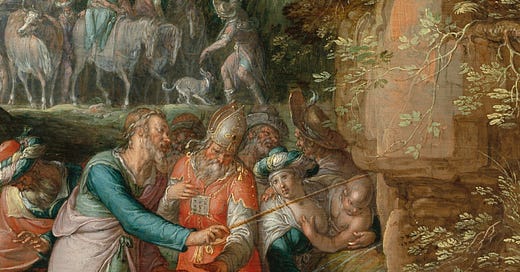There are two episodes in this week's parsha that I want to focus on here. The first takes place just after we are told the Miriam has died. Just after this, and yet again, there is a moment in the desert when the Children of Israel are moaning about not having enough water, and once again ask why they had to be taken out of Egypt to die in the desert. Moses and Aaron lose patience with them and ask God for help, God instructs Moses to “take his staff and speak to the rock in front of the people and order it to give water and thus produce water for them from the rock and provide drink for the people and their animals.” Moses addresses the people “you rebels,” he says, tells them, to watch as he strikes the rock twice with his staff and water springs forth from it. The people drink but immediately afterwards God says to Moses and Aaron “Because you did not believe in me enough to sanctify me before the people, for this you will not lead the people into the land that I shall give them.” We assume that God is angry because instead of speaking to the rock and commanding it to give water, Moses uses force.
The young woman who gave the parsha today at my [amazing, beloved] synagogue had a very interesting understanding of this episode and I’m going to repeat to you what she said: It’s very strange that God punishes Moses and Aaron so harshly for responding in anger to the Children of Israel, not least because no more than a few weeks ago we read about an almost verbatim instance of Bnei Yisrael’s complaints, and that time God was the one who lost His patience and Moses had to appeal to His mercy to keep Him from killing all of them. Confusing, no? But I learnt that according to commentators, in the time since the last complaint, an entire generation has grown up and replaced the one that had been taken out of Egypt [the passage of time in the Bible is an odd thing]. Moses was responding in anger to a people who had never actually been in Egypt, and had never experienced slavery. This is the generation that God had decided would enter the promised land. Moses’ lack trust in God not only to provide water, but also to discern with good judgment whether this generation is worthy of the Land.
The other episode I wanted to discuss is notoriously bizarre: the episode of the red heifer, a divine decree that is utterly nonsensical. In this parsha God tells Moses to instruct a person who has become impure [by touching a dead body] to locate a pure red heifer and bring it to the priest who will burn it in its entirety along with cedar wood, hyssop, and scarlet. The priest will be rendered impure through this process, and he will remain so till evening, as will the person who assisted him in the burning. Someone else must gather up the cow's ashes and bring them outside the camp in a “pure place” — whoever gathers up these ashes will also be rendered impure till evening. Finally, the person who was originally impure from touching a dead body will be impure for seven days. They must purify themselves through the cow’s ashes on both the third and the seventh day, and then they will be pure. If they fail to do this, they must be cut off from the nation or else risk defiling it.
It is a very strange ritual but the part that I find interesting is that the process through which one person becomes pure renders those who assist them in it impure. I think human life is frequently like this. So often the trials that an individual has to undergo in order to develop beyond a lesser version of themselves requires other people to absorb and withstand a degree of — not impurity exactly, but unhealth. I do think a lot of deciding to love and care for another person involves the decision to subject yourself to inconveniences that can rise to the level of hindering your own development so that a person you love can flourish.
(This is not how I picture Moses striking the rock, but apparently it is how Joachim Anthonisz Wtewael did_
Shabbat shalom!
Celeste




